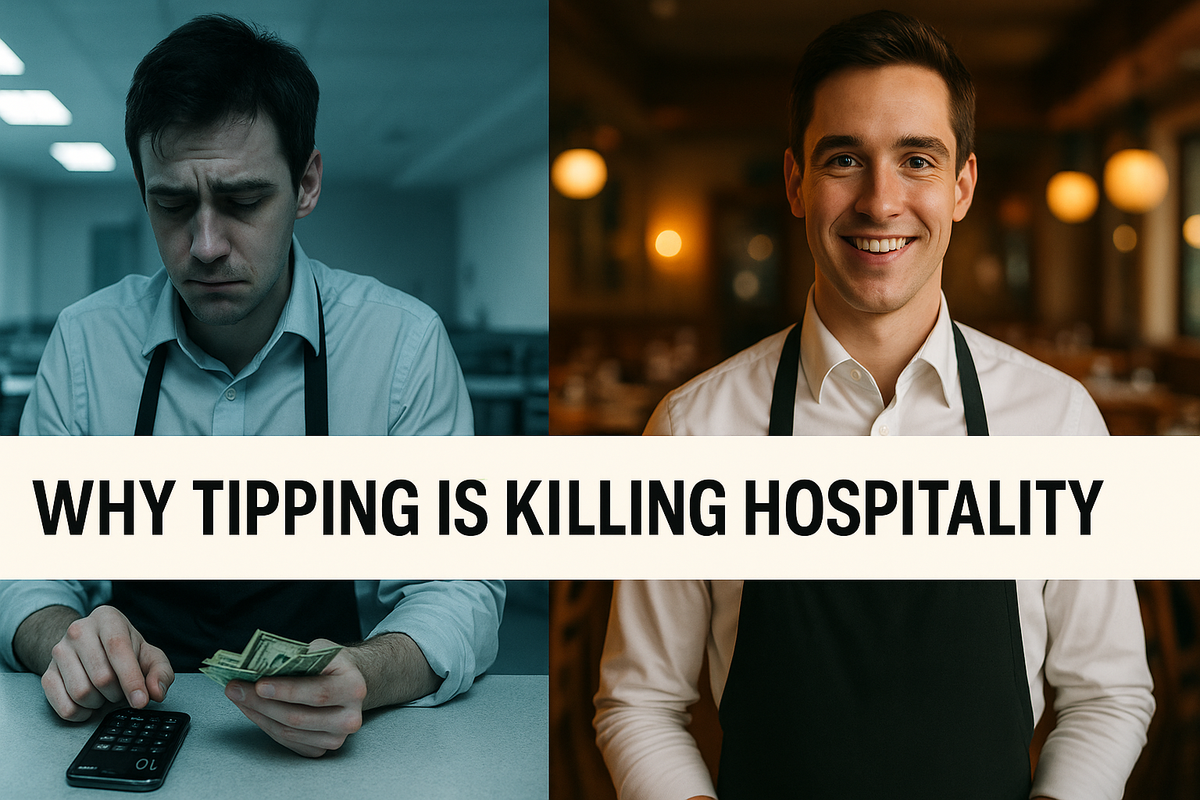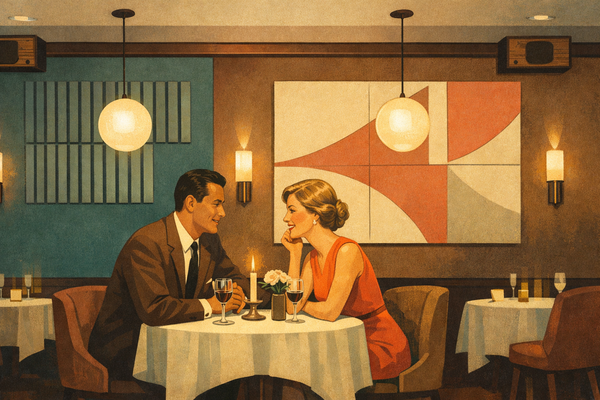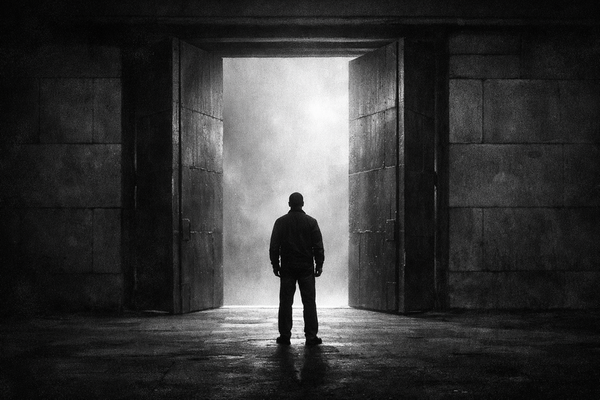Why Tipping Is Killing Hospitality
We live and die by our people, yet built an industry on their instability. Time to pay living wages and let sincere generosity breed generosity.

"If you don't have leverage, create it."
That line keeps showing up in my thinking lately. Because here's the thing about the hospitality industry: we've convinced ourselves we have no leverage. Razor-thin margins. Unpredictable revenue. Labor costs that terrify accountants. We've accepted the rope around our leg as permanent, unbreakable, just the way things are.
But what if the rope was never as strong as we thought?
The Problem We Keep Pretending Isn't There
Let's be honest about what we've built. The American restaurant industry runs on a model that would be unconscionable in almost any other sector: we've outsourced the cost of paying workers to the kindness of strangers.
Think about that. Your server's ability to make rent depends on whether table seven had a good day. Whether the couple at table twelve believes in tipping twenty percent or thinks fifteen is generous. Whether someone decides to round up or round down based on nothing more than mood.
This isn't a business model. It's legalized economic uncertainty masquerading as tradition.
And we justify it with the math: "Margins are too tight." "Labor costs would kill us." "Guests expect lower menu prices." All true statements that have become intellectual ropes holding a much more powerful industry in place.
Meanwhile, our best people burn out and leave. They work doubles to cover emergencies. They smile through stress fractures in their lives because there's no safety net, no anchor, no one saying "I got you" when things fall apart.
We've built an entire industry on instability and called it normal.
Why "Tradition" Is Younger Than You Think
Here's something they don't teach you in restaurant management programs: tipping wasn't always the American way. In fact, it was once considered deeply un-American.
The practice came to the United States in the 1850s and 1860s, brought back by wealthy Americans returning from Europe where tipping had been an aristocratic custom. Lords and ladies tossing coins to servants as a show of superiority. When it hit American shores, it found fertile ground in the post-Civil War economy, where restaurant owners discovered they could avoid paying newly freed slaves and other workers fair wages by shifting the cost to customers through tips.
Let that sink in. The "tradition" we're defending has its roots in avoiding fair payment to workers.
By the early 1900s, the practice had become so offensive to American values that six states actually banned tipping, calling it anti-democratic and a form of bribery. Anti-tipping leagues formed across the country. The practice was seen for what it was: a way for employers to dodge their fundamental responsibility to pay their workers.
But the bans didn't hold. Restaurants fought back, and by the 1920s, especially during Prohibition when restaurants needed every revenue advantage they could find, tipping became normalized again. We've been stuck with it ever since, pretending it's some sacred tradition instead of what it actually is: a relatively recent practice born from the desire to not pay people what they're worth.
So when someone tells you "this is how it's always been done," remember: tipping as we know it is younger than the Interstate Highway System. It's not ancient tradition. It's a choice we keep making.
Why We're Cutting the Wrong Corners
Here's something I've watched play out across dozens of industries over decades: when businesses get squeezed, they almost always cut the wrong things first.
They cut the people. They cut the training. They cut the benefits, the stability, the investment in human capital. They optimize for this quarter's P&L while eroding the foundation that actually generates long-term value.
And they tell themselves it's just good business. Practical. Realistic. "We have to make tough choices."
But here's what I've learned: the "tough choice" is almost always the easy choice dressed up in responsible language. It's easier to cut labor costs than to redesign your pricing model. It's easier to accept turnover than to build retention. It's easier to squeeze what you have than to reimagine what's possible.
The truly tough choice, the one that actually requires courage, is looking at your business model and asking: "What if we refused to build our success on other people's instability?"
That's the corner almost nobody is willing to cut. The corner of conventional thinking. The corner of "this is how it's always been done." The corner of accepted industry norms that don't actually serve anyone except our own unwillingness to think harder.
Why We Live and Die by Our People
Here's the truth that everyone in hospitality knows but few act on: we live and die by our people.
Not our concept. Not our location. Not our menu or our décor or our marketing. Our people.
The person who remembers that table four prefers their water without ice. The line cook who holds the standard when it would be easier to let it slip. The manager who notices when someone's struggling and asks if they're okay. The host who makes people feel seen in the thirty seconds between walking in and being seated.
That's what guests come back for. That's what turns a meal into an experience. That's what separates a restaurant that thrives from one that merely survives.
So when I say "people first," I don't mean it as some feel-good corporate slogan. I mean it as the most hardheaded business strategy there is. Because in hospitality, your people are your product. Everything else is just stage dressing.
And yet somehow, we've built an entire industry that treats its most valuable asset as its most expendable line item.
It's insane when you say it out loud.
Why Hospitality Isn't a Hustle
Here's what I know after years of working with businesses across industries: hospitality isn't supposed to be a side hustle or a temporary gig until something "real" comes along. It's craft. It's skill. It's the art of making people feel cared for in a world that increasingly doesn't care.
But we don't treat it that way.
We treat it like transient labor. We accept turnover rates that would terrify any other industry. We shrug at the idea that someone might do this work for thirty years because we've made it nearly impossible to build a life around it.
And then we wonder why we can't find good people.
The problem isn't a labor shortage. The problem is we're asking professionals to work for amateur wages with no promise of stability. We're asking them to be excellent while treating them as expendable.
We're cutting the corner that actually matters, human investment, while protecting corners that don't, like the illusion that keeping menu prices artificially low through wage subsidization is somehow customer service.
We live and die by our people, but we're killing them slowly with a system that guarantees instability.
That ends when we decide it ends.
What a Different Model Could Look Like
I spend my time at Arkira Partners helping businesses rethink their models, question their assumptions, and build something more sustainable. And increasingly, I find myself asking: what would a restaurant look like if we designed it from scratch around the one truth we all know but rarely act on?
That we live and die by our people. So maybe, just maybe, we should build a model that keeps them alive.
What if we built it on a simple principle: sincere generosity breeds generosity.
Not transactional generosity. Not strategic generosity calculated to extract maximum value. Sincere generosity. The kind that says "I'm going to take care of you because it's the right thing to do, and I trust that good things flow from that."
Why This Isn't Danny Meyer's Model (And Why That Matters)
If you're thinking about Danny Meyer right now, you should be. In 2015, he made headlines by eliminating tipping at his Union Square Hospitality Group restaurants, implementing a "Hospitality Included" model with higher base wages and higher menu prices.
It was bold. It was principled. And it mostly didn't work.
Within a few years, he'd rolled back the policy at most locations. The problems were real: front-of-house staff left for restaurants where they could make more with tips. Guests resisted the higher prices even when they understood the reasoning. The math that looked good on paper hit friction in reality.
But here's the thing: Meyer wasn't wrong about the problem. He was just solving it in a way that created new problems.
The issue with eliminating tipping entirely is that you're fighting human nature on two fronts. You're fighting servers who've built their earning potential around tips and see a guaranteed salary, even a good one, as a pay cut. And you're fighting guests who've been conditioned to see lower menu prices as value, even when they're subsidizing wages through tips on the back end.
The hybrid model is different.
What if you kept tipping but removed the desperation? What if you paid living wages as the foundation, offered real benefits, built actual security, and then let tips be what they should have been all along: genuine expressions of gratitude, not economic necessity?
This solves Meyer's talent problem. Your servers aren't taking a pay cut. They're getting stability plus the upside of great service. The excellent ones probably make more because guests tip better when the service comes from abundance instead of desperation.
It solves the pricing problem. Your menu prices are higher, yes, but you're transparent about why. And guests don't feel the same resistance because they're still participating in the tipping ritual they're comfortable with. They're just doing it from a place of choice rather than obligation.
Most importantly, it solves the culture problem. When tips are additive rather than essential, the entire dynamic changes. Service becomes about genuine connection rather than economic calculation. And that's the thing Meyer was actually trying to create. He just went about it in a way that made it harder than it needed to be.
We learned from his experiment. The principle was right. The execution needed to be smarter.
Here's How It Actually Works
Living Wages as the First Line Item
Start the financial model differently. Before you price a menu, before you project revenue, before you calculate anything else, you start with this number: what does it cost for someone to live with dignity in your city? That's the floor. That's the foundation. Everything else builds from there.
This isn't charity. It's sincere generosity as business strategy.
Most restaurants work backward. They set prices, subtract costs, and whatever's left determines wages. What if you flipped it: set wages, build the rest of the model around that reality, and refuse to open until the numbers actually work?
Because here's what happens when you genuinely take care of people financially: they take care of everything else. Not because you've trained them to or because it's in the handbook, but because sincere generosity breeds generosity.
When you pay someone enough to actually build a life, something shifts. They start showing up differently. They notice the guest who's having a bad day and go the extra mile to turn it around. They stay late to help a teammate who's drowning. They suggest improvements because they're thinking about the business like it's theirs.
You can't mandate that behavior. You can't train it or incentivize it or manage it into existence. It only comes from people who feel genuinely cared for and want to pass that forward.
Health Benefits from Day One
Picture this: someone walks into your kitchen or joins your service team, and they have health benefits immediately. Not in six months. Not after proving themselves. From day one.
Not because you're being generous in the strategic sense. Because you're being generous in the sincere sense. Because you understand that taking care of people's health isn't a perk you extend once they've earned it. It's a fundamental responsibility you accept from day one.
And here's what happens: people notice. They feel it. And they respond in kind.
The line cook who comes in early to prep extra because he knows the dinner rush will be brutal and he wants to set his teammates up for success. The server who trains new hires with patience and care because she remembers what it felt like to be taken care of when she started. The manager who covers a shift without being asked because someone's kid is sick and they know the business has their back.
Sincere generosity breeds generosity. Every single time.
The Anchor Fund: The Safety Net That Actually Catches People
Here's the thing about emergencies: they don't wait until you've saved enough. The car breaks down. The kid gets sick. The rent goes up. Life happens, and it happens to everyone, but it happens harder when you're living paycheck to paycheck.
What if there was an Anchor Fund, a quiet emergency resource funded by a small percentage of profits and optional guest round-up donations? When someone on the team faces a genuine crisis, they're not going to GoFundMe or hoping family can help. They have somewhere to turn.
Because that's what sincere generosity looks like in practice.
This isn't calculated to maximize ROI. It's genuine care structured into the business model. And what happens when people experience that kind of support?
They become the kind of people who offer that kind of support. To guests. To teammates. To the business itself.
The server who notices a regular struggling financially and quietly discounts their meal because "the kitchen made extra." The manager who mentors a struggling employee on their own time because someone once did that for them. The team that voluntarily reorganizes workflow to help each other succeed because that's just what you do in a place that has your back.
Sincere generosity breeds generosity. It spreads. It multiplies. It becomes the culture without anyone having to mandate it.
Tips as Gratitude, Not Dependence
In this model, tipping still exists. Guests can absolutely express appreciation through tips, and team members keep them. But here's the difference: tips are additive, not essential. No one is depending on them to cover basic living expenses. No one is calculating their grocery budget based on whether Saturday night was busy.
When tips become gratitude instead of economic necessity, the entire dynamic changes.
Service becomes about connection instead of calculation. People aren't performing warmth to maximize tips. They're genuinely warm because they're not desperate. And guests feel that difference immediately.
And here's what's remarkable: when you remove the desperation, the tips often get better anyway. Because people recognize and reward genuine care. Sincere generosity breeds generosity, even from strangers.
Why Security Is the New Luxury
You want to know what actually impresses people now? It's not just farm-to-table or small-batch or locally-sourced, though those matter. It's the knowledge that the person serving them isn't secretly drowning.
Guests are smarter than we give them credit for. They can feel the difference between a team that's supported and a team that's surviving. They notice when people seem genuinely happy to be there versus counting hours until their shift ends.
What if security became the ultimate luxury good, extended to the people who create the experience?
Because here's what I've learned: you can't fake the energy that comes from genuine stability. You can train people to smile, to remember orders, to follow procedures. But you can't train the warmth that comes from someone who actually wants to be there. Who feels valued. Who believes their leadership has their back.
That only comes from actually having their back.
And when guests experience that, when they're served by people who are genuinely cared for and who are passing that care forward, they become part of the cycle. They tip better. They come back more often. They tell their friends. They leave reviews that mention not just the food but the feeling of the place.
Sincere generosity breeds generosity. Even in customers.
Why the Math Actually Works
Let me address the elephant in the room: "But the margins..."
Yes. Restaurant margins are notoriously thin. And if you're doing this wrong, just arbitrarily raising labor costs without thinking through the model, you'll go broke fast.
But here's what the traditional math misses:
We're Already Paying. We're Just Paying Stupidly
The corners we cut aren't actually saving us money. They're just moving costs around and making them harder to see.
Turnover isn't free. Every time someone quits, you lose weeks of productivity and thousands in recruiting and training costs. Industry average turnover in restaurants hovers around seventy-five percent annually. What if you could run below twenty percent?
That's not theoretical savings. That's real money that most restaurants are lighting on fire because they're cutting the wrong corner, the corner of human stability, to save pennies on hourly wages.
Why Generosity Has Compound Interest
Here's what accountants miss: generosity multiplies in ways that don't show up on spreadsheets.
When you're sincerely generous with your team, they're sincerely generous with guests. When guests experience that generosity, they're more generous with tips, with return visits, with recommendations, with reviews. When the business does well because of that cycle, there's more to be generous with.
It's a flywheel. But it only works if the generosity is sincere. If it's calculated, if it's strategic in the manipulative sense, people can smell it. They don't respond the same way.
But genuine care? That spreads like wildfire.
The line cook who takes pride in every plate because he's treated with dignity. The server who goes out of her way for difficult customers because she knows what it's like to be cared for when you're struggling. The busser who notices details and fixes them without being asked because he's invested in the place succeeding.
None of that shows up in your labor cost calculation. All of it shows up in your results.
Why Brand Loyalty Compounds
When you stand for something real, when guests know their money is supporting a model they believe in, they come back. They bring friends. They post about it. They become evangelists for what you're building.
You're not competing on price. You're competing on values. And in that game, there's actually less competition than you'd think.
Most businesses cut the corner of meaning to compete on price. What if you protected meaning and trusted that the right customers would find you?
Because the truth is, people will pay more to feel good about where their money goes. Not everyone. But enough. More than enough if your food is excellent and your service is genuine.
Why Pricing Integrity Matters
Imagine being transparent about the model. Not hiding behind "market rate" menu prices and then guilting guests into subsidizing wages through tips. Your prices reflect the true cost of operating with integrity. And you explain why.
I believe guests would respect that. They'd appreciate knowing what they're actually paying for. No hidden costs, no awkward mental math at the end of the meal, no wondering if they tipped "enough."
And here's what's remarkable: when you're honest about the model, guests often become more generous, not less. They round up donations to the Anchor Fund. They tip well even though they know it's not required. They bring friends specifically because of the model.
Sincere generosity breeds generosity. Even in your pricing strategy.
What "I Got You" Really Means
In everything I think about building, I come back to this phrase: "I got you."
Not as marketing. As philosophy. As promise. As the operating principle that flows from actually believing we live and die by our people.
It would mean when you show up to work, you're not worried about whether you can pay your electric bill. It would mean when life throws chaos at you, and it will, you have a team and a structure designed to catch you. It would mean the people leading this aren't treating you as a line item to minimize but as a human to support.
"I got you" is what sincere generosity sounds like when it's not performing.
And here's what I believe: when people genuinely believe you've got them, they've got you right back. Not because you've trained them to or incentivized them to, but because that's how humans work. Sincere generosity breeds generosity.
They stay. They care. They build something with you instead of just working for you. They go the extra mile for customers because that's what you do when someone treats you right. They help teammates because that's the culture that's been modeled for them. They protect the brand because they feel like they're part of something worth protecting.
This isn't soft thinking. This is understanding human nature well enough to build a business model around it.
What Real Legacy Could Look Like
I didn't get into business to help people run the same tired playbook everyone else runs. I'm not interested in perpetuating a system that burns people out and calls it normal.
I want to see someone prove there's another way. Not because it's easy or because the math is simple, but because it's right. Because treating people well isn't a competitive disadvantage. It's the only sustainable advantage left.
This is what legacy actually looks like: not the size of the business, but the quality of the model. Not how much you extracted, but how much you built. Not whether you followed the rules, but whether you had the courage to write new ones.
The hospitality industry doesn't need another restaurant. It needs a different philosophy about what restaurants can be. One that starts from a simple truth: sincere generosity breeds generosity.
So maybe we should act like it.
Someone should build that. A place where if you're a guest, an investor, or someone joining the team, you experience this truth:
I got you.
Not as a slogan. As a lived reality. As the foundation of how the business operates.
The rope was never as strong as it seemed. The corners we've been cutting were always the wrong ones.
Time for someone to start building differently.
Maybe that someone is you. Maybe it's me. Maybe it's both of us, building something together that proves the math works when you lead with sincere generosity and trust that it comes back multiplied.
And when someone does build it, it won't just be another restaurant. It'll be proof that the model everyone said was impossible was just waiting for someone brave enough to build it.
Someone willing to bet everything on something most people have forgotten: sincere generosity breeds generosity.
Every single time.
And when you build a business on that principle, when you're genuinely generous with your people, and they're genuinely generous with your guests, and your guests are genuinely generous in return, you don't just create a restaurant.
You create a place where hospitality actually means something again.
That's not just good business. That's the whole point.
"We make a living by what we get, but we make a life by what we give." ~Winston Churchill




